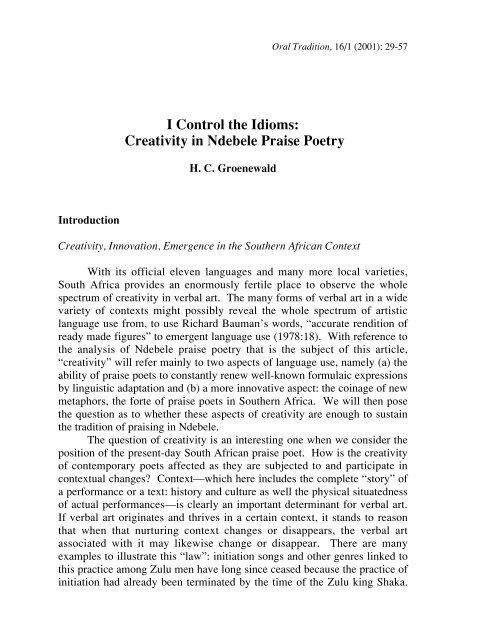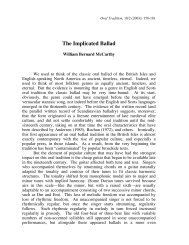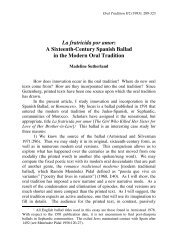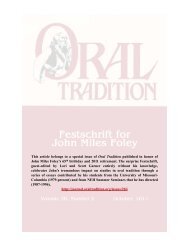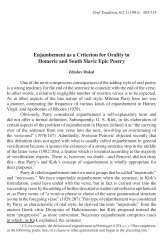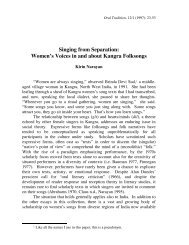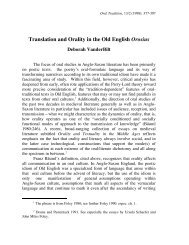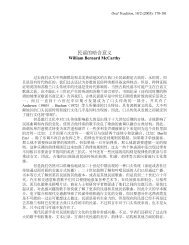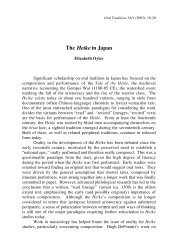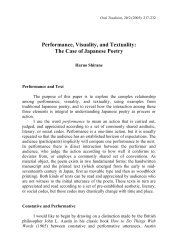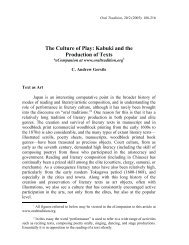I Control the Idioms: Creativity in Ndebele Praise Poetry
I Control the Idioms: Creativity in Ndebele Praise Poetry
I Control the Idioms: Creativity in Ndebele Praise Poetry
You also want an ePaper? Increase the reach of your titles
YUMPU automatically turns print PDFs into web optimized ePapers that Google loves.
Introduction<br />
Oral Tradition, 16/1 (2001): 29-57<br />
I <strong>Control</strong> <strong>the</strong> <strong>Idioms</strong>:<br />
<strong>Creativity</strong> <strong>in</strong> <strong>Ndebele</strong> <strong>Praise</strong> <strong>Poetry</strong><br />
H. C. Groenewald<br />
<strong>Creativity</strong>, Innovation, Emergence <strong>in</strong> <strong>the</strong> Sou<strong>the</strong>rn African Context<br />
With its official eleven languages and many more local varieties,<br />
South Africa provides an enormously fertile place to observe <strong>the</strong> whole<br />
spectrum of creativity <strong>in</strong> verbal art. The many forms of verbal art <strong>in</strong> a wide<br />
variety of contexts might possibly reveal <strong>the</strong> whole spectrum of artistic<br />
language use from, to use Richard Bauman’s words, “accurate rendition of<br />
ready made figures” to emergent language use (1978:18). With reference to<br />
<strong>the</strong> analysis of <strong>Ndebele</strong> praise poetry that is <strong>the</strong> subject of this article,<br />
“creativity” will refer ma<strong>in</strong>ly to two aspects of language use, namely (a) <strong>the</strong><br />
ability of praise poets to constantly renew well-known formulaic expressions<br />
by l<strong>in</strong>guistic adaptation and (b) a more <strong>in</strong>novative aspect: <strong>the</strong> co<strong>in</strong>age of new<br />
metaphors, <strong>the</strong> forte of praise poets <strong>in</strong> Sou<strong>the</strong>rn Africa. We will <strong>the</strong>n pose<br />
<strong>the</strong> question as to whe<strong>the</strong>r <strong>the</strong>se aspects of creativity are enough to susta<strong>in</strong><br />
<strong>the</strong> tradition of prais<strong>in</strong>g <strong>in</strong> <strong>Ndebele</strong>.<br />
The question of creativity is an <strong>in</strong>terest<strong>in</strong>g one when we consider <strong>the</strong><br />
position of <strong>the</strong> present-day South African praise poet. How is <strong>the</strong> creativity<br />
of contemporary poets affected as <strong>the</strong>y are subjected to and participate <strong>in</strong><br />
contextual changes? Context—which here <strong>in</strong>cludes <strong>the</strong> complete “story” of<br />
a performance or a text: history and culture as well <strong>the</strong> physical situatedness<br />
of actual performances—is clearly an important determ<strong>in</strong>ant for verbal art.<br />
If verbal art orig<strong>in</strong>ates and thrives <strong>in</strong> a certa<strong>in</strong> context, it stands to reason<br />
that when that nurtur<strong>in</strong>g context changes or disappears, <strong>the</strong> verbal art<br />
associated with it may likewise change or disappear. There are many<br />
examples to illustrate this “law”: <strong>in</strong>itiation songs and o<strong>the</strong>r genres l<strong>in</strong>ked to<br />
this practice among Zulu men have long s<strong>in</strong>ce ceased because <strong>the</strong> practice of<br />
<strong>in</strong>itiation had already been term<strong>in</strong>ated by <strong>the</strong> time of <strong>the</strong> Zulu k<strong>in</strong>g Shaka.
30 H. C. GROENEWALD<br />
Songs that accompanied <strong>the</strong> communal eradication of locusts have become<br />
defunct because <strong>the</strong> practice itself has become redundant. Folktales are no<br />
longer performed <strong>in</strong> <strong>the</strong> granny-children-fireside situation because <strong>the</strong><br />
“<strong>in</strong>formal” educational and recreational context has been supplanted by<br />
ano<strong>the</strong>r system. On <strong>the</strong> plus side, <strong>in</strong> recent years K<strong>in</strong>g Zwelith<strong>in</strong>i of <strong>the</strong><br />
Zulus has revived certa<strong>in</strong> customs that have been ext<strong>in</strong>ct for many decades.<br />
One could cite <strong>the</strong> so-called Reed and First Fruits ceremonies as examples.<br />
S<strong>in</strong>ce <strong>the</strong> orig<strong>in</strong>al verbal art associated with <strong>the</strong>se ceremonies is not known,<br />
songs belong<strong>in</strong>g to o<strong>the</strong>r events (such as wedd<strong>in</strong>gs) have to be imported to<br />
make <strong>the</strong>se occasions work. They are performed <strong>in</strong> addition to <strong>the</strong> praise<br />
poetry that now also forms part of such ceremonies.<br />
<strong>Praise</strong> <strong>Poetry</strong> Scholarship and <strong>the</strong> Art of Prais<strong>in</strong>g<br />
In South African universities praise poetry scholarship has, until<br />
recently, been produced by African language departments, where, generally<br />
speak<strong>in</strong>g, formalism seems to be a way of life. The traditions of prais<strong>in</strong>g<br />
that have attracted <strong>the</strong> most attention by far are Xhosa and Zulu, and not<br />
without reason; <strong>the</strong>se languages boast <strong>the</strong> most speakers, and prais<strong>in</strong>g is<br />
correspond<strong>in</strong>gly <strong>the</strong> most diversified and developed <strong>in</strong> <strong>the</strong>se traditions. 1<br />
Apart from <strong>the</strong> fact that languages o<strong>the</strong>r than Xhosa and Zulu have been<br />
more thoroughly studied lately, <strong>the</strong> genre of prais<strong>in</strong>g has also attracted <strong>the</strong><br />
attention of scholars <strong>in</strong> o<strong>the</strong>r departments, and with it diverse critical<br />
questions have been applied to <strong>the</strong> practice of prais<strong>in</strong>g. For <strong>in</strong>stance, when<br />
deal<strong>in</strong>g with oral art Michael Chapman observes: “The oral voice places <strong>the</strong><br />
critic under an obligation—I shall argue—to <strong>in</strong>terpret oral tradition as<br />
reta<strong>in</strong><strong>in</strong>g a contentious capacity: as a usable past” (1996:18). The question<br />
can <strong>the</strong>n be posed as to “how usable” this art form is <strong>in</strong> <strong>the</strong> lives of <strong>the</strong><br />
people, and to what extent <strong>the</strong> practice of prais<strong>in</strong>g is someth<strong>in</strong>g of <strong>the</strong> past.<br />
That Chapman is th<strong>in</strong>k<strong>in</strong>g of prais<strong>in</strong>g not only as someth<strong>in</strong>g <strong>in</strong>tensely<br />
concerned with history is clear from this statement: “The ‘imbongi’ glories<br />
<strong>in</strong> <strong>the</strong> command of royal performance, and while it is easy to be swept along<br />
by <strong>the</strong> recitation of accumulated images <strong>in</strong>to a past age of blood and thunder,<br />
questions persist as to whe<strong>the</strong>r <strong>the</strong> ancient panegyric should, or can, be<br />
recovered as anyth<strong>in</strong>g but a curiosity” (60). While for some<br />
observers—African and non-African language speakers alike—prais<strong>in</strong>g may<br />
1 In this <strong>in</strong>troductory part of <strong>the</strong> paper terms such as ukubonga (“prais<strong>in</strong>g, to<br />
praise”), imbongi (“praise poet”) and so on, will be shunned as far as possible so as to<br />
avoid <strong>the</strong> canoniz<strong>in</strong>g of culture-specific terms.
NDEBELE PRAISE POETRY 31<br />
be little more than a curiosity, what cannot be denied is <strong>the</strong> fact that this<br />
ancient form of verbal art rema<strong>in</strong>s a vibrant, highly developed genre <strong>in</strong><br />
Sou<strong>the</strong>rn Africa. Every scholar who has studied <strong>the</strong> genre has at least<br />
acknowledged that <strong>the</strong> praise poem “has rema<strong>in</strong>ed resilient <strong>in</strong> its potential<br />
for renewal and relevance” and that “<strong>the</strong> praise poem is <strong>in</strong> fact Sou<strong>the</strong>rn<br />
Africa’s most characteristic form of literary expression which, prior to its<br />
written record<strong>in</strong>gs <strong>in</strong> <strong>the</strong> n<strong>in</strong>eteenth century, has been observed as early as<br />
<strong>the</strong> seventeenth century at <strong>the</strong> court of a Shona k<strong>in</strong>g” (Chapman 1996:55).<br />
If <strong>the</strong> praise poem is Africa’s most characteristic form, it has ga<strong>in</strong>ed<br />
this reputation by <strong>the</strong> sheer diversity of performance situations <strong>in</strong> which it<br />
occurs and its host of diverse types. <strong>Praise</strong> poems <strong>in</strong> Sou<strong>the</strong>rn Africa can be<br />
found anywhere from <strong>the</strong> private bedroom to <strong>the</strong> public political meet<strong>in</strong>g,<br />
from <strong>the</strong> family occasion to <strong>the</strong> trade union ga<strong>the</strong>r<strong>in</strong>g, and on subjects from<br />
toddlers to recently deceased elders. A few examples will suffice. Among<br />
o<strong>the</strong>r types, Alec Pongweni (1996) gives many examples of gender- and<br />
clan-specific sexual praise poems recited only after sexual <strong>in</strong>tercourse.<br />
Predictably, this sort of poem for <strong>the</strong> male is characterized by images of<br />
conquer<strong>in</strong>g, a topic that is also prevalent <strong>in</strong> <strong>the</strong> praise poetry for k<strong>in</strong>gs or<br />
chiefs and political leaders (Gunner 1999). Indeed, <strong>the</strong> extoll<strong>in</strong>g of different<br />
k<strong>in</strong>ds of “warriors” is probably <strong>the</strong> most visible type of praise poetry <strong>in</strong><br />
South Africa. In recent years we have seen how leaders of all <strong>the</strong> major<br />
political parties were praised dur<strong>in</strong>g <strong>the</strong>ir campaigns for <strong>the</strong> 1998 election.<br />
President Mbeki was honored by poets of <strong>the</strong> major African languages at his<br />
<strong>in</strong>auguration <strong>in</strong> July 1998. When <strong>the</strong> delegation of <strong>the</strong> <strong>in</strong>ternational football<br />
federation (FIFA) visited South Africa <strong>in</strong> 2000 to evaluate its ability to host<br />
<strong>the</strong> 2006 soccer world cup, it was enterta<strong>in</strong>ed by a praise poet. The praise<br />
poem for k<strong>in</strong>gs and chiefs has also been adapted to serve <strong>the</strong> trade union<br />
movement (Kromberg 1993).<br />
The highly revered clan praise poem is <strong>in</strong>dispensable at ga<strong>the</strong>r<strong>in</strong>gs of<br />
a lim<strong>in</strong>al nature—mov<strong>in</strong>g <strong>in</strong>to adulthood, pass<strong>in</strong>g from one marital state to<br />
ano<strong>the</strong>r, or at burials. An <strong>in</strong>dividual can thus be <strong>the</strong> beneficiary of more<br />
than one k<strong>in</strong>d of praise poem. In <strong>the</strong> past it was quite common for Zulu<br />
mo<strong>the</strong>rs to compose izangelo for a child after its birth. Izangelo is “praise<br />
poetry” <strong>in</strong> <strong>the</strong> sense that it is composed for a specific child but actually<br />
provides an opportunity for <strong>the</strong> mo<strong>the</strong>r to lament aspects of her married life<br />
and to rem<strong>in</strong>isce <strong>the</strong> circumstances of <strong>the</strong> child’s birth. As a child grows he<br />
or she may acquire praise names for certa<strong>in</strong> achievements; <strong>the</strong>se names form<br />
<strong>the</strong> basis of <strong>the</strong> praise poem “proper.” Zulu izigiyo are short praises,<br />
particular to a certa<strong>in</strong> person, uttered when that person performs <strong>the</strong><br />
vigorous giya danc<strong>in</strong>g at festive occasions.
32 H. C. GROENEWALD<br />
The most common raison d’être, <strong>in</strong> my view, is <strong>the</strong> proclaim<strong>in</strong>g of <strong>the</strong><br />
<strong>in</strong>dividual’s uniqueness, regardless of what feature makes that <strong>in</strong>dividual<br />
unique. This expla<strong>in</strong>s why <strong>in</strong> izihasho—<strong>the</strong> Zulu praise poetry for common<br />
people (Turner 1990)—and even <strong>in</strong> izibongo zamakhosi, Zulu praises for<br />
k<strong>in</strong>gs or chiefs, a person can be praised us<strong>in</strong>g items that range from peculiar<br />
little <strong>in</strong>cidents to <strong>the</strong> most vulgar characteristics. In praise poetry for <strong>the</strong><br />
rul<strong>in</strong>g Zulu monarch, K<strong>in</strong>g Zwelith<strong>in</strong>i, one can f<strong>in</strong>d <strong>the</strong> follow<strong>in</strong>g l<strong>in</strong>es<br />
(Mkhize 1989:108):<br />
Mfula kaNdab’ ogobhoz’ ekhanda<br />
LikaMatanzima kwelaseKoloni<br />
AmaXhos’ onke’ anway’ izimpandla<br />
Athi y<strong>in</strong>i liyanetha mfond<strong>in</strong>i<br />
Kanti kugoboz’ uMageba.<br />
River of Ndaba that flows on <strong>the</strong> head<br />
Of Matanzima of <strong>the</strong> Cape Colony,<br />
All <strong>the</strong> Xhosas scratch <strong>the</strong>ir bald heads<br />
Say<strong>in</strong>g is it ra<strong>in</strong><strong>in</strong>g my bro<strong>the</strong>r?<br />
In fact it is Mageba who is flow<strong>in</strong>g.<br />
These l<strong>in</strong>es refer to a seem<strong>in</strong>gly <strong>in</strong>significant <strong>in</strong>cident, namely that while<br />
fly<strong>in</strong>g over <strong>the</strong> former Transkei, K<strong>in</strong>g Zwelith<strong>in</strong>i had to use <strong>the</strong> restroom.<br />
Similarly, a certa<strong>in</strong> Nomsa is praised as follows (Turner 1990:118):<br />
Uvovo liyavuza<br />
Kadlulwa z<strong>in</strong>daba<br />
Kadlulwa bhulukwe<br />
Umathanga akahlangani<br />
Uyazivulukela uma ebona ibhulukwe.<br />
Stra<strong>in</strong>er is leak<strong>in</strong>g,<br />
No news passes her by,<br />
No trousers pass her by,<br />
Lady Thighs <strong>the</strong>y don’t meet [= she doesn’t sit discreetly],<br />
She just opens when she sees trousers.<br />
Prais<strong>in</strong>g is not directed at people only. Molefe (1992) gives an account of<br />
<strong>the</strong> praises of 16 k<strong>in</strong>ds of domestic animals where <strong>the</strong> poems for <strong>the</strong> pig are<br />
<strong>the</strong> longest at more than 40 l<strong>in</strong>es. The prais<strong>in</strong>g of div<strong>in</strong><strong>in</strong>g bones and <strong>the</strong><br />
ancestors is a focus for some izangoma (Zulu healers) as <strong>the</strong>y conduct <strong>the</strong>ir<br />
sessions.
Formal Conventions<br />
NDEBELE PRAISE POETRY 33<br />
A comparison of <strong>the</strong> different praises mentioned so far would reveal<br />
how similar <strong>the</strong>y are <strong>in</strong> terms of formal conventions. Invariably, <strong>the</strong><br />
enigmatic characteristics and deeds of <strong>the</strong> subject are clo<strong>the</strong>d <strong>in</strong> metaphor,<br />
<strong>the</strong> trope that rules supreme <strong>in</strong> <strong>the</strong> praise poem. These metaphors range<br />
from relatively simple equation (expressed <strong>in</strong> a s<strong>in</strong>gle noun) to extensive<br />
syntactical and multiple semantic layer<strong>in</strong>g. The nature and extensive use of<br />
metaphor is <strong>the</strong> result of praise poetry’s peculiar reference system, as Kar<strong>in</strong><br />
Barber (1999:29-30) has shown: “<strong>the</strong> conventions of <strong>the</strong> genre require or<br />
encourage various k<strong>in</strong>ds of oblique, opaque or far fetched attachment of<br />
mean<strong>in</strong>g. It is as if composers and listeners are play<strong>in</strong>g a game of<br />
signification, <strong>in</strong> which mean<strong>in</strong>gs are generated, secreted, and withheld or<br />
retrieved accord<strong>in</strong>g to def<strong>in</strong>ite and specialised conventions, and where<br />
access to <strong>the</strong>se mean<strong>in</strong>gs may be highly restricted, filtered or layered.”<br />
This way of referr<strong>in</strong>g to people, events, and places (though hardly<br />
ever dates) has strong bear<strong>in</strong>g on how praise poetry deals with history, one<br />
of <strong>the</strong> issues of <strong>in</strong>terest <strong>in</strong> <strong>the</strong> study of <strong>the</strong> genre. In a study on a hi<strong>the</strong>rto<br />
unknown corpus of praises, namely that of <strong>the</strong> Hananwa <strong>in</strong> <strong>the</strong> Nor<strong>the</strong>rn<br />
Prov<strong>in</strong>ce of South Africa, Annekie Joubert and J. A. Van Schalkwyk<br />
(1999:46) take <strong>the</strong> view that <strong>the</strong> praise poem <strong>the</strong>y analyze “gives a<br />
comprehensive account of <strong>the</strong> 1894 siege of Blouberg. It narrates <strong>the</strong> same<br />
historical <strong>in</strong>formation, but from <strong>the</strong> po<strong>in</strong>t of view of an ‘<strong>in</strong>sider’.” Later on<br />
<strong>the</strong>y confirm as follows: “It also demonstrates <strong>the</strong> historic competence of <strong>the</strong><br />
oral poet. The diachronic course of <strong>the</strong> events of <strong>the</strong> war as narrated <strong>in</strong> <strong>the</strong><br />
poem is logical and tallies with o<strong>the</strong>r orally transmitted versions. By<br />
assimilat<strong>in</strong>g all <strong>the</strong> cross references among <strong>the</strong> proxemic markers, <strong>the</strong><br />
listener is able to reconstruct a clear picture of <strong>the</strong> events of 1894” (ibid.:46).<br />
However, when one looks at <strong>the</strong> poem, referential clarity is extremely hard<br />
to f<strong>in</strong>d. When <strong>the</strong> authors speak of “<strong>the</strong> same historical <strong>in</strong>formation,” <strong>the</strong>ir<br />
statement must by no means be understood as “historically accurate or clear<br />
data.” The poem understandably does not capture historical details precisely<br />
and comprehensively—for example, <strong>the</strong>re are no dates <strong>in</strong> <strong>the</strong> poem, and <strong>the</strong><br />
politician who ordered <strong>the</strong> war is simply referred to as Paul.<br />
The important po<strong>in</strong>t is that a history of <strong>the</strong> war is presented from <strong>the</strong><br />
viewpo<strong>in</strong>t of <strong>the</strong> subjugated. It is <strong>the</strong> experience of and reactions to events<br />
that must not be forgotten; <strong>in</strong> <strong>the</strong> words of Leroy Vail and Landeg White<br />
(1991:64) <strong>the</strong> praises are <strong>the</strong> history. Vail and White thus speak of history<br />
as metaphor (as opposed to history as code) and history as drama (73), while
34 H. C. GROENEWALD<br />
Duncan Brown (1998:108) speaks of history as rhetorical presence. Barber<br />
aptly summarizes this k<strong>in</strong>d of signification as follows (1999:41): “This is a<br />
mode that seems to be founded on <strong>the</strong> flight <strong>in</strong>to metaphor, not cancell<strong>in</strong>g<br />
literal truth—ra<strong>the</strong>r, reta<strong>in</strong><strong>in</strong>g fact as its guarantor and bedrock—but simply<br />
evad<strong>in</strong>g specification.” Thus <strong>the</strong> metaphors <strong>in</strong> praise poetry “tend to draw<br />
attention not to specific, idiosyncratic features of <strong>the</strong> subject <strong>in</strong> question but<br />
to a generalised value such as strength, beauty or value” (idem). And<br />
remembrance of this k<strong>in</strong>d is best activated through public performance.<br />
Formal equivalence (repetition), although less <strong>in</strong> evidence than<br />
metaphor and o<strong>the</strong>r tropes, rhythmically punctuates <strong>the</strong> excitement created<br />
by <strong>the</strong> action motifs. Repetition can be found <strong>in</strong> sounds and syllables, verb<br />
and noun stems (commonly called l<strong>in</strong>k<strong>in</strong>g), complete words and phrases,<br />
grammatical and semantic structure (referred to as parallelism), and <strong>the</strong><br />
recurrence of popular action motifs, which are shared even across different<br />
languages. For <strong>in</strong>stance, <strong>the</strong> formulaic expression “run ye along all <strong>the</strong><br />
paths” (Gunner and Gwala 1991:19, 54) shows that this expression occurs <strong>in</strong><br />
<strong>the</strong> Zulu praises of Shaka, Chief Albert Luthuli, and those of <strong>the</strong> present<br />
Zulu monarch, K<strong>in</strong>g Goodwill Zwelith<strong>in</strong>i. The latter’s impend<strong>in</strong>g ascent to<br />
<strong>the</strong> throne is decscribed as follows (see especially <strong>the</strong> underl<strong>in</strong>ed section):<br />
Nani magundwane ahlala eyikho<strong>the</strong>ni kwaNongoma<br />
gijimani nge ‘ndlela zonkana niyobikela abangake-e-ZW-A!<br />
Nithi “Lukhulu luyeza luyanyelela,<br />
silufanisa nendlovu emnyama yasoBhalule<br />
luzoshis’ i’khotha zakwaNongoma.”<br />
And you rats that live <strong>in</strong> <strong>the</strong> long grass at Nongoma<br />
run along all <strong>the</strong> paths and go and announce to those who haven’t HE-A-ARD!<br />
Say “Someth<strong>in</strong>g big is com<strong>in</strong>g, it is sneak<strong>in</strong>g up,<br />
we compare it to <strong>the</strong> black elephant of Bhalule<br />
it will burn <strong>the</strong> long grass of Nongoma.”<br />
The formulaic expression appears at least six times <strong>in</strong> <strong>Ndebele</strong> praise poetry,<br />
<strong>in</strong>clud<strong>in</strong>g three times <strong>in</strong> a poem by K<strong>in</strong>g Mayisha II himself (or Pr<strong>in</strong>ce<br />
Cornelius, as he was known when <strong>the</strong> research was done) on Mabhoko, <strong>the</strong><br />
n<strong>in</strong>eteenth-century <strong>Ndebele</strong> chief. 2<br />
There are, of course, many o<strong>the</strong>r poetic devices, such as <strong>the</strong><br />
manipulation of grammar, direct address, and so forth. But <strong>the</strong> fact that<br />
Sou<strong>the</strong>rn African praise poetry makes use of similar devices does not mean<br />
that different traditions’ ways of remember<strong>in</strong>g <strong>the</strong> subject are <strong>the</strong> same. An<br />
2 See <strong>the</strong> <strong>Ndebele</strong> examples below.
NDEBELE PRAISE POETRY 35<br />
<strong>in</strong>tense debate has, for <strong>in</strong>stance, been waged over <strong>the</strong> memory versus<br />
improvisation issue. We have come to accept that while most of <strong>the</strong><br />
Sou<strong>the</strong>rn African prais<strong>in</strong>g traditions may be predom<strong>in</strong>antly memorial, Xhosa<br />
has <strong>in</strong> addition excelled <strong>in</strong> improvisation. Should a Xhosa imbongi (praise<br />
poet), for example, be asked to perform at a certa<strong>in</strong> event he may well have a<br />
lot of th<strong>in</strong>gs to say about <strong>the</strong> event itself, not to mention <strong>the</strong> person he may<br />
be prais<strong>in</strong>g. Much of what <strong>the</strong> imbongi says may never be heard aga<strong>in</strong>. The<br />
Zulu imbongi, on <strong>the</strong> o<strong>the</strong>r hand, will prefer to perform <strong>the</strong> praise poetry of a<br />
person he has come to know over <strong>the</strong> years and about whom he has<br />
composed a relatively stable set of praises. A phrase such as “relatively<br />
stable” <strong>in</strong> <strong>the</strong> discourse on praise poetry needs some qualification. Although<br />
poets are often adamant that a person’s praises cannot be changed, we<br />
understand that <strong>the</strong>y mean among o<strong>the</strong>r th<strong>in</strong>gs that s<strong>in</strong>ce a person’s praises<br />
are <strong>in</strong> a sense <strong>the</strong> person himself or herself, <strong>the</strong>y should always be performed<br />
<strong>in</strong> <strong>the</strong> usual revered fashion, that one cannot detract from what a person has<br />
achieved, and so on. <strong>Praise</strong> poets, on <strong>the</strong> o<strong>the</strong>r hand, are sometimes<br />
oblivious to <strong>the</strong> fact that <strong>the</strong>y make use of vary<strong>in</strong>g grammatical<br />
constructions to say “<strong>the</strong> same th<strong>in</strong>g,” that <strong>the</strong>y are switch<strong>in</strong>g <strong>the</strong> order of<br />
motifs, and that <strong>the</strong>y are “forgett<strong>in</strong>g” certa<strong>in</strong> motifs. What <strong>the</strong>y are<br />
profoundly aware of is that <strong>the</strong>ir subject is always grow<strong>in</strong>g <strong>in</strong> stature through<br />
<strong>in</strong>teractions with people and events and that <strong>the</strong> poets accord<strong>in</strong>gly have to<br />
keep track of his or her actions.<br />
There are also contextual and situational aspects to consider. <strong>Praise</strong><br />
poets have to th<strong>in</strong>k about <strong>the</strong> particular occasion and, importantly (perhaps<br />
especially for “memorial praise poets”), whom <strong>the</strong>y will be prais<strong>in</strong>g. Be<strong>in</strong>g<br />
clad <strong>in</strong> sk<strong>in</strong>s and brandish<strong>in</strong>g a stick or spear is not absolutely necessary for<br />
some poets to function well. The photograph below of <strong>the</strong> well-known Zulu<br />
praise poet, J. Dlam<strong>in</strong>i, shows him clad <strong>in</strong> trousers and a golf shirt as he was<br />
prais<strong>in</strong>g Mangosuthu Bu<strong>the</strong>lezi (M<strong>in</strong>ister of Home Affairs, but officiat<strong>in</strong>g as<br />
<strong>the</strong> chief of <strong>the</strong> Bu<strong>the</strong>lezi clan) at a Shaka Day ceremony on September 25,<br />
1999. Audience participation also differs from occasion to occasion. At <strong>the</strong><br />
Shaka Day ceremony just cited, <strong>the</strong> audience stood reverently as <strong>the</strong>y<br />
listened to <strong>the</strong> praises of Bu<strong>the</strong>lezi. The poet did not provide an occasion for<br />
<strong>the</strong> audience to utter <strong>the</strong> well-known participation formula “Musho!”<br />
(“Speak him forth!”). By contrast, <strong>the</strong> <strong>Ndebele</strong> praise poet mentioned later<br />
<strong>in</strong> this paper always performed <strong>in</strong> front of lively, even rowdy participants.<br />
He often paused to accommodate participation and not seldom had to<br />
recommence a l<strong>in</strong>e when <strong>the</strong> crowd was too noisy.
36 H. C. GROENEWALD<br />
Functions<br />
J. Dlam<strong>in</strong>i prais<strong>in</strong>g chief Mangosuthu Bu<strong>the</strong>lezi, Shaka Day ceremonies,<br />
25 September 1999, at Stanger, KwaZulu-Natal.<br />
<strong>Praise</strong> poetry’s function is largely determ<strong>in</strong>ed by <strong>the</strong> context and<br />
situation <strong>in</strong> which it is performed. Clan poetry performed at wedd<strong>in</strong>gs and<br />
praises <strong>in</strong> <strong>the</strong> context of div<strong>in</strong><strong>in</strong>g are clearly more mediatory <strong>in</strong> that <strong>the</strong>y<br />
serve to make a connection with <strong>the</strong> ancestors. <strong>Poetry</strong> extoll<strong>in</strong>g chiefs or<br />
k<strong>in</strong>gs and political figures may range from serv<strong>in</strong>g as a “traditional” means<br />
of propaganda 3 to offer<strong>in</strong>g highly critical remarks. Essentially though,<br />
praise poetry seeks to <strong>in</strong>dividualize, that is, to set <strong>the</strong> <strong>in</strong>dividual apart from<br />
all o<strong>the</strong>rs, to build and ma<strong>in</strong>ta<strong>in</strong> his or her austere character and position.<br />
Whatever <strong>the</strong> case, audiences enjoy it immensely, so that <strong>the</strong> functions of<br />
enterta<strong>in</strong>ment and education (<strong>in</strong> <strong>the</strong> sense of <strong>in</strong>culcat<strong>in</strong>g <strong>the</strong> conventions of<br />
<strong>the</strong> genre) must not be underestimated. Vail and White strongly argue that<br />
oral poetry is driven by what <strong>the</strong>y call poetic license: “<strong>the</strong> convention that<br />
poetic expression is privileged expression, <strong>the</strong> performer be<strong>in</strong>g free to<br />
express op<strong>in</strong>ions that would o<strong>the</strong>rwise be <strong>in</strong> breach of o<strong>the</strong>r social<br />
seq.).<br />
3 See Vail and White’s analysis of Swazi royal praises <strong>in</strong> this regard (1991:155 et
NDEBELE PRAISE POETRY 37<br />
conventions” (1991:319). Accord<strong>in</strong>gly, <strong>the</strong>y contend, this aes<strong>the</strong>tic should<br />
form <strong>the</strong> bedrock of a poetics for oral poetry.<br />
A Tradition <strong>in</strong> Transition<br />
In <strong>the</strong> long history that <strong>the</strong> praise poem evidently enjoys, colonial and<br />
subsequent political <strong>in</strong>terventions have probably brought about <strong>the</strong> greatest<br />
changes. But while <strong>the</strong>se <strong>in</strong>terventions have not been k<strong>in</strong>d to some<br />
traditions of prais<strong>in</strong>g, o<strong>the</strong>r varieties are as vibrant as ever. While Barber<br />
ma<strong>in</strong>ta<strong>in</strong>s that “<strong>the</strong> heyday of praise production <strong>in</strong> both Sotho and Yoruba<br />
cultures is essentially over” (1999:33) and although this observation also<br />
applies to o<strong>the</strong>r cultures <strong>in</strong> Sou<strong>the</strong>rn Africa, it does not mean that no praises<br />
are ever recited <strong>in</strong> <strong>the</strong>se cultures. The residue of knowledge <strong>in</strong> <strong>the</strong> art of<br />
prais<strong>in</strong>g surfaces when <strong>the</strong> need arises, albeit sometimes as a somewhat<br />
canonized piece of culture—someth<strong>in</strong>g produced, for <strong>in</strong>stance, at culturespecific<br />
national days <strong>in</strong>stituted under apar<strong>the</strong>id, at <strong>the</strong> open<strong>in</strong>g of a new<br />
prov<strong>in</strong>cial parliamentary session, and so on. The changes to <strong>the</strong> tradition<br />
could be summarized as an irrevocable distanc<strong>in</strong>g of praise poets from<br />
traditional contexts, as Russell Kaschula affirms (1991:47): “Any romantic<br />
view of <strong>the</strong> present day imbongi as a traditionalist attached only to chiefs<br />
would be redundant and naïve.” The weaken<strong>in</strong>g of <strong>the</strong> system of clan and<br />
tribal chiefs is probably one of <strong>the</strong> major factors <strong>in</strong> <strong>the</strong> decl<strong>in</strong>e of prais<strong>in</strong>g <strong>in</strong><br />
certa<strong>in</strong> cultures. But as old systems are replaced by new, some traditions<br />
have simply <strong>in</strong>serted <strong>the</strong> praise poem <strong>in</strong>to <strong>the</strong> new system and <strong>in</strong> <strong>the</strong> process<br />
have adapted <strong>the</strong> genre, whe<strong>the</strong>r marg<strong>in</strong>ally or more profoundly. 4<br />
The f<strong>in</strong>d<strong>in</strong>gs of Jeff Opland (1975), published more than twenty-five<br />
years ago about <strong>the</strong> chang<strong>in</strong>g role of <strong>the</strong> praise poet, are still valid today. I<br />
have adapted his and o<strong>the</strong>r researchers’ f<strong>in</strong>d<strong>in</strong>gs graphically as illustrated <strong>in</strong><br />
<strong>the</strong> diagram on <strong>the</strong> next page. The vertical l<strong>in</strong>e illustrates <strong>the</strong> context<br />
cont<strong>in</strong>uum and <strong>the</strong> horizontal l<strong>in</strong>e <strong>the</strong> mode of delivery cont<strong>in</strong>uum; <strong>the</strong><br />
former will be discussed first. The resident, full-time imbongi was not<br />
primarily an enterta<strong>in</strong>er at <strong>the</strong> chief’s or k<strong>in</strong>g’s homestead. 5 His services had<br />
4 Relatively profound adaptation occurs <strong>in</strong> <strong>the</strong> case of <strong>the</strong> so-called worker poetry,<br />
for example; see Kromberg 1993.<br />
5 The highest political leader <strong>in</strong> traditional African communities is <strong>the</strong> “chief”<br />
(<strong>in</strong>kosi <strong>in</strong> Zulu, ikosi <strong>in</strong> <strong>Ndebele</strong>, and so on) who rules with<strong>in</strong> a clan. In Zulu history,<br />
however, s<strong>in</strong>ce <strong>the</strong> imperialistic rule of Shaka (1818-28), <strong>the</strong> head of <strong>the</strong> Zulu clan is<br />
recognized as ruler (k<strong>in</strong>g) of <strong>the</strong> Zulu nation. The same generic term, <strong>in</strong>kosi, is used to<br />
refer to <strong>the</strong> “k<strong>in</strong>g” (but, <strong>in</strong> order to recognize his supreme status, <strong>the</strong> Zulu k<strong>in</strong>g is
38 H. C. GROENEWALD<br />
Imbongi 1<br />
Resident, full-time, efficacious<br />
<strong>Praise</strong>r <strong>Praise</strong>r, writer, reciter<br />
Imbongi 2 Imbongi 3<br />
Removed, part-time, efficacious, ceremonial<br />
Positions occupied by past and contemporary praise poets<br />
to do with <strong>the</strong> serious bus<strong>in</strong>ess of enhanc<strong>in</strong>g <strong>the</strong> political image of <strong>the</strong> chief.<br />
If <strong>the</strong> chief’s medic<strong>in</strong>e man and div<strong>in</strong>er guaranteed his good stand<strong>in</strong>g with<br />
<strong>the</strong> ancestors, <strong>the</strong> praise poet guaranteed his good stand<strong>in</strong>g with <strong>the</strong> ord<strong>in</strong>ary<br />
people. Although <strong>the</strong> praise poet of today does not reside at <strong>the</strong> chief’s place<br />
any longer and does not praise him moment by moment (for <strong>in</strong>stance, when<br />
he appears <strong>in</strong> <strong>the</strong> morn<strong>in</strong>g after his night’s rest or when he meets with his<br />
headmen), his role is still to a large degree an efficacious one. The chief<br />
without a praise poet is as unth<strong>in</strong>kable, especially among <strong>the</strong> Nguni people<br />
(<strong>Ndebele</strong>, Swati, Xhosa, Zulu), as one without a div<strong>in</strong>er. But over and<br />
above <strong>the</strong> efficacious functions of <strong>the</strong> contemporary praise poet—<strong>in</strong>clud<strong>in</strong>g<br />
mediation and especially <strong>in</strong>dividualization or image-build<strong>in</strong>g—<strong>the</strong><br />
commemorative or ceremonial function has developed. The contemporary<br />
praise poet is perfectly at ease <strong>in</strong> render<strong>in</strong>g his services simply to grace <strong>the</strong><br />
occasion, as was evident when a number of praise poets performed at<br />
President Thabo Mbeki’s <strong>in</strong>auguration ceremony <strong>in</strong> July, 1999.<br />
The left-to-right cont<strong>in</strong>uum shows that <strong>the</strong> oral poet has become one<br />
who not only praises traditionally and orally, 6 but one who also documents<br />
generally called isilo, a term of respect mean<strong>in</strong>g “lion”). Henceforth <strong>the</strong> title “chief” will<br />
be used, but “k<strong>in</strong>g” must be understood where <strong>the</strong> context requires it.<br />
6 Taken <strong>in</strong> <strong>the</strong> sense Foley (1988, 1996) expla<strong>in</strong>s <strong>the</strong>se terms.
NDEBELE PRAISE POETRY 39<br />
his own poetry and writes o<strong>the</strong>r poems. Once oral poetry has been<br />
documented, <strong>the</strong> way is open for <strong>the</strong> reciter who wishes to learn <strong>the</strong> praises<br />
and recite <strong>the</strong>m when occasion arises. To summarize: Imbongi 1 is <strong>the</strong><br />
traditional poet who was attached to <strong>the</strong> chief’s household and who ate from<br />
his table. Then we f<strong>in</strong>d <strong>the</strong> poet of colonial times and <strong>the</strong>reafter, Imbongi 2.<br />
Although he praised <strong>the</strong> chief as often as was necessary, he was no longer a<br />
remunerated, resident poet. Today we also f<strong>in</strong>d <strong>the</strong> poet who praises orally<br />
and who documents his or her poetry, Imbongi 3. Here we also encounter<br />
<strong>the</strong> new poets, <strong>the</strong> worker poets, who perform at trade union rallies, funerals,<br />
and so on.<br />
<strong>Creativity</strong> <strong>in</strong> <strong>Ndebele</strong> <strong>Praise</strong> <strong>Poetry</strong><br />
The ma<strong>in</strong> focus of this paper is on some aspects of my research on<br />
ama<strong>Ndebele</strong> verbal art, praise poetry <strong>in</strong> particular, which was undertaken<br />
between 1986 and 1996. Apart from giv<strong>in</strong>g a little-known culture some<br />
exposure, I am <strong>in</strong>terested <strong>in</strong> ascerta<strong>in</strong><strong>in</strong>g how <strong>Ndebele</strong> praise poetry has<br />
been affected <strong>in</strong> <strong>the</strong> light of <strong>the</strong> changes <strong>in</strong> <strong>the</strong> tradition as explored above.<br />
Although <strong>the</strong> ama<strong>Ndebele</strong> live throughout <strong>the</strong> central areas of <strong>the</strong><br />
Mpumalanga prov<strong>in</strong>ce <strong>in</strong> South Africa, large numbers of isi<strong>Ndebele</strong><br />
speakers are concentrated <strong>in</strong> <strong>the</strong> former Kwa<strong>Ndebele</strong> homeland about 150<br />
kilometers nor<strong>the</strong>ast of Pretoria. A great deal of <strong>the</strong> <strong>Ndebele</strong> praise poetry<br />
was performed <strong>in</strong> <strong>the</strong> traumatic year of 1988 when <strong>the</strong> former homeland of<br />
Kwa<strong>Ndebele</strong> was forced <strong>in</strong>to an election for <strong>the</strong> acceptance or rejection of<br />
an <strong>in</strong>dependent Kwa<strong>Ndebele</strong> state. Chief M<strong>in</strong>ister Majozi Mahlangu and his<br />
legislative assembly took former President P.W. Botha’s bait and advocated<br />
<strong>in</strong>dependence, while <strong>Ndebele</strong> Ingwenyama (chief) Mabhoko and his sons,<br />
who toge<strong>the</strong>r with o<strong>the</strong>r opponents were kicked out of <strong>the</strong> legislative<br />
assembly and jailed on various occasions, rejected <strong>in</strong>dependence. As <strong>the</strong><br />
chief’s sons visited various venues—ma<strong>in</strong>ly black townships outside <strong>the</strong><br />
homeland—to rally people aga<strong>in</strong>st <strong>in</strong>dependence, <strong>the</strong>y were accompanied by<br />
<strong>the</strong> chief’s praise poet, Sovetjeza Mahlangu (born <strong>in</strong> 1940), who contributed<br />
his prais<strong>in</strong>g abilities to <strong>the</strong> service of a political cause. The political<br />
meet<strong>in</strong>gs usually progressed as follows. While people were arriv<strong>in</strong>g, usually<br />
<strong>in</strong> groups s<strong>in</strong>g<strong>in</strong>g topical songs, Sovetjeza would praise well-known <strong>Ndebele</strong><br />
chiefs of old, with his usual emphasis on Mabhoko, <strong>in</strong> whose time Boer<br />
settlers encroached on <strong>Ndebele</strong> land (1845). At <strong>the</strong> arrival of Ingwenyama<br />
Mabhoko and his sons (or only <strong>the</strong> latter), Sovetjeza aga<strong>in</strong> praised Mabhoko.<br />
Thereafter he would praise Pr<strong>in</strong>ce Cornelius (<strong>the</strong> elder son of Ingwenyama
40 H. C. GROENEWALD<br />
Mabhoko) and Pr<strong>in</strong>ce James, respectively, as well as o<strong>the</strong>r important<br />
speakers, prior to <strong>the</strong>ir deliver<strong>in</strong>g <strong>the</strong>ir speeches.<br />
Naturally, some praise poets f<strong>in</strong>d <strong>the</strong>mselves on more than one po<strong>in</strong>t<br />
on <strong>the</strong> cont<strong>in</strong>uum from oral poet to reciter/writer, as described above.<br />
Sovetjheza Mahlangu, <strong>the</strong> imbongi yakwaMabhoko (Mabhoko’s praise<br />
poet), is just such a versatile poet. He grew up learn<strong>in</strong>g to praise <strong>the</strong><br />
<strong>Ndebele</strong> amakhosi (chiefs) <strong>in</strong> traditional contexts but is also able to praise<br />
o<strong>the</strong>r subjects. He was, for <strong>in</strong>stance, one of <strong>the</strong> performers at President<br />
Mbeki’s <strong>in</strong>auguration ceremony. When on occasion my fellow fieldworker<br />
Philemon Ntuli and I spoke to him about his poetry, he demonstrated that he<br />
was able to praise Mandela, whom he had not met at that stage (1990). He<br />
gave us <strong>the</strong> follow<strong>in</strong>g l<strong>in</strong>es <strong>in</strong> typical Sovetjeza style, with a long, dramatic<br />
open<strong>in</strong>g l<strong>in</strong>e:<br />
UMandela ungumlilo owawuvutha wabonw’ abelungu bawu<strong>the</strong>la<br />
ngamanzi kanti kulapho uzabhebhe<strong>the</strong>ka<br />
UMandela y<strong>in</strong>dlovu eyathi iphuma esirhogweni<br />
Itja yezizwe yavuka uhlanya ithi ayifuni ma-homeland<br />
Kasafuni makhosi.<br />
Mandela is <strong>the</strong> fire that flared up that was seen by <strong>the</strong> whites as <strong>the</strong>y<br />
doused it with water and yet he was to be prosperous.<br />
Mandela is <strong>the</strong> elephant who when he came out of jail<br />
<strong>the</strong> youth of <strong>the</strong> nations awoke (and became) a madman say<strong>in</strong>g <strong>the</strong>y don’t<br />
want any homeland.<br />
They want no k<strong>in</strong>gs.<br />
Look<strong>in</strong>g at <strong>the</strong> art of prais<strong>in</strong>g by Sovetjeza, <strong>the</strong>re is no doubt that he is a<br />
productive and creative imbongi. In o<strong>the</strong>r words, he is able to produce<br />
praise poetry of both traditional and contemporary political figures at will.<br />
But how he learned his craft is <strong>in</strong>terest<strong>in</strong>g. Although we had spoken to him<br />
on a few occasions, he was very reluctant to reveal details about himself. 7<br />
Mbulawa Abram Mahlangu, known among <strong>the</strong> people as Sovetjeza,<br />
had to go and live with his uncle at <strong>the</strong> age of six when his fa<strong>the</strong>r died. After<br />
13 years he went to stay with ano<strong>the</strong>r uncle, SoJafutha. It was dur<strong>in</strong>g this<br />
later period that he took an <strong>in</strong>terest <strong>in</strong> <strong>Ndebele</strong> history; he was taught about<br />
<strong>the</strong> succession of Mabhoko’s descendants and where <strong>the</strong>y had built <strong>the</strong>ir<br />
homesteads. He was <strong>in</strong>itiated <strong>in</strong> 1962, and when he was with his district age<br />
group at <strong>the</strong> house of one of <strong>the</strong> amasokana (<strong>in</strong>itiates), he heard a woman<br />
prais<strong>in</strong>g <strong>the</strong> chiefs of old. Enthused by this performance, he went home to<br />
7 The facts I present here come from M. Mahlangu et al. 1987:i et seq.
NDEBELE PRAISE POETRY 41<br />
fetch a book and pencil and, one afternoon when <strong>the</strong> amasokana were at <strong>the</strong><br />
next <strong>in</strong>itiate’s house, he asked <strong>the</strong> woman to recite those iimbongo (<strong>Ndebele</strong><br />
for praises) while he wrote <strong>the</strong>m down. On ano<strong>the</strong>r traditional occasion<br />
when his uncle held a feast to thank <strong>the</strong> ancestors (ukubonga abezimu), he<br />
aga<strong>in</strong> listened with great <strong>in</strong>terest as an aunt praised. He also asked her to<br />
help him write down <strong>the</strong> poems she performed. On this second occasion it<br />
was <strong>the</strong> iimbongo of <strong>the</strong> <strong>Ndebele</strong> chiefs Mkhephule and Rhobongo. From an<br />
old man of <strong>the</strong> Msiza clan he learned more iimbongo as a result of hav<strong>in</strong>g<br />
bought him some sorghum beer. Afterward he went around collect<strong>in</strong>g and<br />
record<strong>in</strong>g <strong>the</strong> praises of <strong>the</strong> chiefs. In 1969 at <strong>the</strong> Nyabela Day celebration<br />
he spontaneously ascended <strong>the</strong> rock (used as an address platform) after<br />
ano<strong>the</strong>r imbongi had praised. He notes that <strong>the</strong>re was much applause and <strong>the</strong><br />
people were amazed at <strong>the</strong> verbal dexterity of a man who was <strong>the</strong>n only 30<br />
years old. After this performance he was asked to praise at many meet<strong>in</strong>gs<br />
of a cultural nature and became known as an imbongi. Sovetjeza is a<br />
descendant of Matsitsi (<strong>in</strong> turn a descendant of Mabhoko) and says that of<br />
<strong>the</strong> 23 male descendants of Matsitsi he is <strong>the</strong> only one with a deep <strong>in</strong>terest <strong>in</strong><br />
<strong>the</strong> history and iimbongo of Mabhoko’s progeny.<br />
My first record<strong>in</strong>gs of Sovetjeza’s iimbongo <strong>in</strong> 1986 at <strong>the</strong> Nyabela<br />
Day festival <strong>in</strong>cluded, strangely enough, only one l<strong>in</strong>e for Mabhoko, a l<strong>in</strong>e<br />
that does not occur <strong>in</strong> his later versions, namely<br />
UMabhoko uyabusa bayavungama<br />
Mabhoko rules while <strong>the</strong>y are uneasy<br />
The later versions performed at political meet<strong>in</strong>gs conta<strong>in</strong>, on average, about<br />
40 l<strong>in</strong>es. Sovetjeza’s compositions for Pr<strong>in</strong>ce James numbered 11 l<strong>in</strong>es <strong>in</strong><br />
1986 compared to 32 l<strong>in</strong>es <strong>in</strong> a version recorded two years later. Likewise,<br />
<strong>the</strong> earlier record<strong>in</strong>gs for Pr<strong>in</strong>ce James conta<strong>in</strong> portions that do not occur<br />
later, such as<br />
Umkhonto l’ onzima ushokoloze ilif’ elimnyama<br />
Lisiza nesiwezulu lasabalala.<br />
This black assegai aggravated (? -shokoloza is archaic) a black cloud<br />
It comes with <strong>the</strong> first ra<strong>in</strong>s and <strong>the</strong>n vanishes.<br />
Sovetjeza’s repertoire is a fraction of what praise poets of o<strong>the</strong>r<br />
traditions, notably Zulu and Xhosa, are capable of, but <strong>the</strong>n it must be<br />
remembered that Sovetjeza praises at least 15 traditional chiefs of <strong>the</strong> past
42 H. C. GROENEWALD<br />
and at least four contemporary leaders. Although creativity is ma<strong>in</strong>ta<strong>in</strong>ed<br />
pr<strong>in</strong>cipally by present<strong>in</strong>g well-known motifs or <strong>the</strong>mes <strong>in</strong> different<br />
grammatical configurations and syntactical comb<strong>in</strong>ations, completely novel<br />
<strong>the</strong>mes do emerge, such as <strong>the</strong> reference to <strong>the</strong> Swazis <strong>in</strong> <strong>the</strong> last l<strong>in</strong>e of <strong>the</strong><br />
follow<strong>in</strong>g selection of Mabhoko’s praises:<br />
Mabhoko yakha ngamad’ amahlahla<br />
Nang’ uMswaz’ ugangile.<br />
Maphos’ umkhontro azondwa eSwaz<strong>in</strong>i<br />
Uzondwe konoMswazi<br />
Abansibazibomvu zifana nezegwalagwala.<br />
(Musho! ) 8<br />
Mabhoko build with long poles [= defend yourself well]<br />
[because] here is <strong>the</strong> <strong>in</strong>solent Mswazi.<br />
Hurler of <strong>the</strong> assegai hated <strong>in</strong> Swaziland<br />
He is hated by <strong>the</strong> mo<strong>the</strong>r of Mswazi<br />
Those of [= <strong>the</strong> people of] <strong>the</strong> red fea<strong>the</strong>r resemble those of [= <strong>the</strong> fea<strong>the</strong>rs<br />
of] <strong>the</strong> Knysna lourie.<br />
(Musho!)<br />
The last l<strong>in</strong>e of <strong>the</strong> praise selections, richly coded grammatically, bears an<br />
om<strong>in</strong>ous resemblance to <strong>the</strong> expression “Jozi libomvu iz<strong>in</strong>kwalankwala”<br />
(“assegai red with blotches”). Such l<strong>in</strong>es, probably composed dur<strong>in</strong>g<br />
performance, bear testimony to Sovetjeza’s creative ability. But he is not<br />
only an oral performer; he also records praise poetry and writes poetry that<br />
departs from iimbongo. 9<br />
Before look<strong>in</strong>g at an example of a reciter <strong>in</strong> <strong>the</strong> praiser-writer-reciter<br />
cont<strong>in</strong>uum, a brief view of creativity among o<strong>the</strong>r <strong>Ndebele</strong> speakers may be<br />
of <strong>in</strong>terest. Sovetjeza was not <strong>the</strong> only person we came across dur<strong>in</strong>g our<br />
fieldwork who made use of iimbongo. First, <strong>the</strong>re were those among <strong>the</strong><br />
audience who were not only able to repeat a few l<strong>in</strong>es, but who could work<br />
creatively with familiar l<strong>in</strong>es. In fact, some older men praised with verses<br />
never used by Sovetjeza <strong>in</strong> his performances (but that do appear <strong>in</strong><br />
Mahlangu et al. 1987). For example, at Mamelodi, a township just north<br />
east of Pretoria, a man praised Mabhoko after Sovetjeza concluded a seven-<br />
8 The usual response of agreement and encouragement. This is actually <strong>the</strong> Zulu<br />
form; <strong>the</strong> <strong>Ndebele</strong> response is Mutjho!, as is heard <strong>in</strong> some of <strong>the</strong> praises.<br />
9 See M. Mahlangu et al. 1987 and M. Mahlangu and C. Mahlangu 1995.
NDEBELE PRAISE POETRY 43<br />
l<strong>in</strong>e second poem for him. Note how Mabhoko is addressed as Nyabela. 10<br />
The praiser commences with a l<strong>in</strong>e that is so well-known that it can probably<br />
be quoted by virtually all <strong>Ndebele</strong> people, but <strong>the</strong> l<strong>in</strong>es that follow are never<br />
utilized by Sovetjeza:<br />
Mabhoko S<strong>in</strong>deni umhlab’ unethuli.<br />
UMabhoko ubhodele amatje ngengubo<br />
Bathi bacenga 11 naye wazicengel’<br />
. . . (<strong>in</strong>audible)<br />
Siphalaphala siphos’ simnyama. 5<br />
Bamkhulu!<br />
SoMtjongweni!<br />
Nyabela!<br />
Mabhoko Escapee when <strong>the</strong> world is dusty [= <strong>in</strong> turmoil].<br />
Mabhoko collects stones <strong>in</strong> a garment<br />
When <strong>the</strong>y begged him he begged for himself [= he just calmed down]<br />
. . . [<strong>in</strong>audible]<br />
The beautiful one who hurls when he is dark [= furious]. 5<br />
Grandfa<strong>the</strong>r!<br />
SoMtjongweni!<br />
Nyabela!<br />
Second, dignitaries who delivered speeches at <strong>the</strong> meet<strong>in</strong>gs often<br />
praised Mabhoko before <strong>the</strong>y spoke. Solly Mahlangu (nicknamed “Speaker”<br />
because he was Speaker of <strong>the</strong> Kwa<strong>Ndebele</strong> Legislative Assembly before he<br />
was removed), although not a very dynamic speaker or praiser, was also able<br />
to employ l<strong>in</strong>es that Sovetjeza never used. At Vosloorus, Solly praised<br />
Mabhoko with <strong>the</strong> follow<strong>in</strong>g words before he spoke:<br />
Ngwenyama<br />
Mabhoko<br />
S<strong>in</strong>deni umhlab’ onethuli<br />
Langa eliphezulu<br />
Elishis’ amabele 5<br />
10 The <strong>Ndebele</strong> hero who was besieged by Boer commandoes and who was<br />
captured only when he came out of his fortress fac<strong>in</strong>g starvation, and who is<br />
commemorated annually on 19 December.<br />
11 Both <strong>in</strong> this version and <strong>in</strong> <strong>the</strong> one <strong>in</strong> Mahlangu et al. 1987, note <strong>the</strong> word<br />
cenga—l<strong>in</strong>e 3, of unknown mean<strong>in</strong>g to speakers we asked. Accord<strong>in</strong>g to Bhuti<br />
Skhosana, lecturer <strong>in</strong> <strong>Ndebele</strong> <strong>in</strong> <strong>the</strong> Department of African Languages, University of<br />
Pretoria, it would be more apporpriate if <strong>the</strong> word were ncenga, or “beg.”
44 H. C. GROENEWALD<br />
We khuthani namavilakazi<br />
Madoda gijimani ngazo zoke iz<strong>in</strong>dlela nibatjele KwaMhlanga<br />
Nithi Ingwenyama ayiv<strong>in</strong>jelwa i<strong>in</strong>yanyopha [?last word not<br />
clearly audible].<br />
[Much cheer<strong>in</strong>g]<br />
Ngwenyama 12<br />
Mabhoko<br />
Escapee <strong>in</strong> a dusty world<br />
Sun on high<br />
that scorched <strong>the</strong> sorghum. 5<br />
You, <strong>the</strong> diligent and <strong>the</strong> lazy [= all people]<br />
Men, run along all <strong>the</strong> paths and tell <strong>the</strong>m at KwaMhlanga.<br />
Say <strong>the</strong> Ingwenyama is not stopped by thugs [?last word not clearly<br />
audible].<br />
[Much cheer<strong>in</strong>g]<br />
Apart from l<strong>in</strong>es 1-3, all verses were apparently composed by Mahlangu<br />
himself. Recognized praise poets, it would seem, are conservative and seek<br />
to keep iimbongo unchanged. They are probably <strong>the</strong> first to emphasize that<br />
praises “cannot be changed.” O<strong>the</strong>r poets who do not share this burden<br />
often work more creatively.<br />
As he praised before deliver<strong>in</strong>g his speech, Pr<strong>in</strong>ce Cornelius (elder<br />
son of Ingwenyama Mabhoko, and <strong>the</strong> present rul<strong>in</strong>g monarch of <strong>the</strong><br />
Ndzundza section of <strong>the</strong> <strong>Ndebele</strong>) made quite a few changes to <strong>the</strong> praises of<br />
Mabhoko. It is clear that he was us<strong>in</strong>g <strong>the</strong> medium to convey messages to<br />
former President P.W. Botha:<br />
Niyok’bikela uBotha<br />
Ukuthi uMajozi uluzile.<br />
[Great response by all <strong>in</strong> <strong>the</strong> clapp<strong>in</strong>g of hands]<br />
Bathi Ma<strong>Ndebele</strong>, gijimani ngazo zoke iz<strong>in</strong>dlela<br />
Niyok’thokoz’ uRamodike 5<br />
Undunankulu waseLebowa [Cheer<strong>in</strong>g starts before close of <strong>the</strong><br />
l<strong>in</strong>e and almost drowns <strong>the</strong> next l<strong>in</strong>e]<br />
Nithi usebenzile.<br />
You [pl.] go and report to Botha<br />
That Majozi has lost.<br />
[Great response by all <strong>in</strong> <strong>the</strong> clapp<strong>in</strong>g of hands]<br />
They say <strong>Ndebele</strong> people, run ye along all <strong>the</strong> paths,<br />
Go and thank Ramodike 5<br />
Chief M<strong>in</strong>ister of Lebowa [Cheer<strong>in</strong>g starts before close of <strong>the</strong><br />
12 The standard address for <strong>the</strong> <strong>the</strong>n-reign<strong>in</strong>g <strong>Ndebele</strong> chief.
NDEBELE PRAISE POETRY 45<br />
l<strong>in</strong>e and almost drowns <strong>the</strong> next l<strong>in</strong>e]<br />
You should say: he has worked [= done well].<br />
A Creative Reciter<br />
The sequel to <strong>the</strong> electioneer<strong>in</strong>g meet<strong>in</strong>gs was a thanksgiv<strong>in</strong>g meet<strong>in</strong>g<br />
held at Ingwenyama Mabhoko’s homestead on August 5, 1989. He called<br />
<strong>the</strong> meet<strong>in</strong>g to thank his subjects for <strong>the</strong> peace that had returned to <strong>the</strong> strifetorn<br />
area. It was also clearly an occasion to recognize <strong>the</strong>ir support that<br />
resulted <strong>in</strong> <strong>the</strong> successful contest<strong>in</strong>g of <strong>the</strong> election. At this ceremony <strong>the</strong><br />
emcee called on a lad about thirteen years old to praise. He apologized for<br />
not call<strong>in</strong>g Sovetjeza, but said that he wanted to surprise <strong>the</strong> people and<br />
show <strong>the</strong>m that talented youths are available <strong>in</strong> Kwa<strong>Ndebele</strong>. He also<br />
mentioned that <strong>the</strong> boy had learned <strong>the</strong> praises from <strong>the</strong> book Igugu<br />
Lama<strong>Ndebele</strong> (M. Mahlangu et al. 1987). The emcee <strong>the</strong>n told <strong>the</strong> boy to<br />
relax, and <strong>the</strong> lad <strong>in</strong>troduced himself and praised as follows:<br />
Ngilotjhisa Ingwenyama, ngiyalotjhisa namaduna namakhosana<br />
wok’ aKwa<strong>Ndebele</strong>.<br />
NgiwuMagadangana kaMphikeleli koQasha l’ eMathysloop<br />
ofundafunda eKwagga eSokhapha is’kole.<br />
Ngifunda ibanga les<strong>in</strong>e. 5<br />
Iibongo kaMabhoko.<br />
Mabhoko S<strong>in</strong>deni umhlab’ unethuli.<br />
Silembe sakoSiphiwa ikom’ erag’ abelusi.<br />
Ndlel’ ezimazombe z<strong>in</strong>jengobunyonyo nabuyokudla <strong>in</strong>yanga<br />
yezulu koSontimba<br />
Mvumazoke kaMagodongo 10<br />
Ongasayikwala ndaba<br />
Indaba kaPiet wayivumela nekaFrans wayivumela.<br />
(Enthusiastic Musho!)<br />
Ith<strong>in</strong>i? Idung’ amanzi kwakuya kwamuka umfundisi Mvalo<br />
Mhlambi wamahhatjhi wabelungu odle kaFrans wehloli.<br />
(Mutjho!)<br />
Imbiza ephekwe phezu kwelitje iphuphume yatjhisa umdoko 15<br />
Simakhomba lapho.<br />
UMkhananda wakithi uyakhona ongasayikutjhiwa majarha<br />
Owadla njengamabutho waNongabulana<br />
Wawad<strong>in</strong>dela njengamabibi wez<strong>in</strong>dlela<br />
Akwandaba zalutho 20<br />
Igeqe elimnyama<br />
Asiso igeqe lakudla iz<strong>in</strong>komo zamadoda<br />
Rhotjha limnyama amanye ayakhanya.
46 H. C. GROENEWALD<br />
(Mutjho!)<br />
‘bob’buyisa bebe<strong>the</strong> <strong>in</strong>arha<br />
Bebe<strong>the</strong> uMlitjhe noNgwanaphaphu 25<br />
Silwa nez<strong>in</strong>kunzi eentrath’<br />
Sizibulale sisale silwa nazimbili.<br />
(Mutjho!)<br />
Indaba <strong>in</strong>osongo bayisongela<br />
Kanti wena usongele ukwaphula umgobo wamajarha eDid<strong>in</strong>i<br />
Bath’ bayakwakha ngamad’ amahlahla uMswazi ugangile 30<br />
kwaMabhoko<br />
KwaMabhoko akuvalwa ngamnyango kuvalwa ngamakhanda amajarha<br />
eDid<strong>in</strong>i.<br />
(Mutjho!)<br />
Maphosa umkhonto eSwaz<strong>in</strong>i<br />
Uzondwe ngonoMswazi<br />
Yiziqatha ezibomvu usiso ijozi lokugwaza iz<strong>in</strong>komo zamadoda<br />
Ijozi lokugwaza abeSuthu 35<br />
Ijozi lokugwaza amaSwazi.<br />
(Kwa-kwa-kwa-kwa-kwa [<strong>the</strong> usual deferential response of a<br />
woman])<br />
Idlovu bayibona idlovu yakhamba kwaNdiyase esangweni bayibona<br />
ngomgoga bathi kusile uSothakazi<br />
Amakhuwa angesiza likhona ivimbela lekhethu lakosoMalungwana.<br />
[Cheer<strong>in</strong>g, but specific responses <strong>in</strong>audible]<br />
NguMabusabesala kaMagodongo nguMabusa bengafuni 40<br />
Ngowavimbela evimbela ubuyani bembeth’ <strong>in</strong>arha<br />
Bembe<strong>the</strong> uKhunwana noSakazana<br />
Kwakumhla kaMzilikazi kaMatjhobana.<br />
[Specific responses <strong>in</strong>audible]<br />
UMabhoko wathatha iz<strong>in</strong>dlela ezimazombe eziya eRholweni<br />
Y<strong>in</strong>dlandla yakoS’phiwa eyakhwela kwelitje kwadabuka uMzilikazi 45<br />
kaMatjhobana.<br />
[Cheer<strong>in</strong>g, but specific responses <strong>in</strong>audible]<br />
UMabhoko yitjirhi njengehlabathi is<strong>in</strong>d<strong>in</strong>diwana ngangembho<br />
kom’ ibov’ ’akoNomalanga<br />
Ngilihlwana libov’ kwezamadoda ungadla zakhe uyajabajaba.<br />
[Specific responses <strong>in</strong>audible]<br />
Mabhoko isihlangu esimnyama imilambo emibili 50<br />
Eseyama iNgemana neNont<strong>in</strong>do<br />
Isihlangu esivikela ama<strong>Ndebele</strong> mhla kunguMzilikazi kaMatjhobana.<br />
[Specific responses <strong>in</strong>audible]<br />
UMabhoko is<strong>in</strong>akanaka esanakazela emmangweni weMangwana<br />
uMabamba abokomo ngesilevu nguSothakazi.<br />
(I greet <strong>the</strong> Ingwenyama, I also greet <strong>the</strong> headmen and all <strong>the</strong> sub-chiefs<br />
of Kwa<strong>Ndebele</strong>.
NDEBELE PRAISE POETRY 47<br />
I am Magadangana of Mphikeleli of Qasha’s place at Mathysloop<br />
who is learn<strong>in</strong>g at Sokhapha School at Kwaggafonte<strong>in</strong>.) 13<br />
I am <strong>in</strong> standard 4. 5<br />
The iibongo 14 of Mabhoko.<br />
Mabhoko Escapee when <strong>the</strong> world is dusty.<br />
Hoe of Siphiwa’s place, <strong>the</strong> cow that kicks <strong>the</strong> herd boys.<br />
W<strong>in</strong>d<strong>in</strong>g ways like ants as <strong>the</strong>y go and devour <strong>the</strong> medic<strong>in</strong>e man<br />
at <strong>the</strong> place of Sontimba.<br />
Agreer to everyth<strong>in</strong>g of Magodongo 10<br />
Who will not refuse any matter.<br />
He agreed to <strong>the</strong> matter of Piet and that of Frans he agreed to.<br />
[Enthusiastic Musho!]<br />
What does it say? It makes <strong>the</strong> water murky until <strong>the</strong> m<strong>in</strong>ister<br />
Mvalo left<br />
Herd of horses of <strong>the</strong> whites who devoured those of Frans, of <strong>the</strong> spy.<br />
(Mutjho!)<br />
The pot that was cooked on a stone, it boiled over and burnt <strong>the</strong> 15<br />
porridge<br />
The one who po<strong>in</strong>ts <strong>the</strong>re.<br />
Mkhananda of ours, he is able to do that which <strong>the</strong> young men can’t,<br />
Who ate <strong>the</strong> warriors of Nongabulana<br />
He heaped <strong>the</strong>m up like dirt on <strong>the</strong> road<br />
It became a matter of no consequence. 20<br />
Black frontal cover<strong>in</strong>g [? archaic]<br />
It isn’t a frontal cover<strong>in</strong>g that devoured <strong>the</strong> cattle of <strong>the</strong> men.<br />
Dark fearsome man while o<strong>the</strong>rs are light.<br />
(Mutjho!)<br />
Br<strong>in</strong>g <strong>the</strong>m [ants?] back to cover <strong>the</strong> land<br />
To cover Mlitjhe and Ngwanaphaphu. 25<br />
The one who fights three bulls<br />
It killed <strong>the</strong>m rema<strong>in</strong><strong>in</strong>g to fight with one.<br />
(Mutjho!)<br />
The matter is an oath, <strong>the</strong>y swore to it<br />
In fact you swore to break <strong>the</strong> shield [?umgobo is archaic] of <strong>the</strong> young<br />
men of Did<strong>in</strong>i<br />
While <strong>the</strong>y are build<strong>in</strong>g with long poles (= defend<strong>in</strong>g <strong>the</strong>mselves),<br />
Mswazi is <strong>in</strong>solent (= attack<strong>in</strong>g) at Mabhoko’s place 30<br />
At Mabhoko’s place <strong>the</strong>y are not clos<strong>in</strong>g with a door, <strong>the</strong>y are clos<strong>in</strong>g<br />
with <strong>the</strong> heads of <strong>the</strong> young men of Did<strong>in</strong>i.<br />
(Mutjho!)<br />
Hurler of <strong>the</strong> assegai <strong>in</strong> Swaziland.<br />
13 The paren<strong>the</strong>tical section of <strong>the</strong> translation was performed by <strong>the</strong> emcee as <strong>the</strong><br />
boy presented himself.<br />
14 The standard orthography is iimbongo.
48 H. C. GROENEWALD<br />
You are hated by <strong>the</strong> mo<strong>the</strong>r of Mswazi<br />
It is red hooves, you are <strong>the</strong> assegai stabb<strong>in</strong>g <strong>the</strong> cattle of <strong>the</strong> men<br />
The assegai to stab <strong>the</strong> Sothos 35<br />
The assegai to stab <strong>the</strong> Swazis.<br />
(Kwa-kwa-kwa-kwa 15 )<br />
The elephant <strong>the</strong>y saw walk<strong>in</strong>g at Ndiyase, <strong>the</strong>y saw it at <strong>the</strong> gate by<br />
means of its trunk [?umgoga is archaic] when it dawned,<br />
it is Sothakazi.<br />
The whites may come, our defender of <strong>the</strong> place of Malungwana’s<br />
fa<strong>the</strong>r is present.<br />
[Cheer<strong>in</strong>g, but specific responses <strong>in</strong>audible]<br />
It is Mabusabesala of Magodongo,<br />
it is <strong>the</strong> Ruler <strong>the</strong>y don’t want. 40<br />
It is <strong>the</strong> one who fended off <strong>the</strong> ants as <strong>the</strong>y covered <strong>the</strong> earth<br />
As <strong>the</strong>y covered Khunwana and Sakazana.<br />
[Specific responses <strong>in</strong>audible]<br />
On <strong>the</strong> day of Mzilikazi of Mashobana.<br />
[Cheer<strong>in</strong>g, but specific responses <strong>in</strong>audible]<br />
Mabhoko took w<strong>in</strong>d<strong>in</strong>g ways that led to Rholweni.<br />
He is <strong>the</strong> tall elephant of <strong>the</strong> place of Siphiwa that climbed<br />
on a rock and Mzilikazi of Mashobana was split. 45<br />
[Specific responses <strong>in</strong>audible]<br />
Mabhoko is an irritation between <strong>the</strong> teeth like sand, <strong>the</strong> short one,<br />
red cow of <strong>the</strong> place of Nomalanga<br />
Reddish eye 16 with regard to <strong>the</strong> affairs of <strong>the</strong> men, he f<strong>in</strong>ishes his<br />
and is up and down. 17<br />
[Specific responses <strong>in</strong>audible]<br />
Mabhoko is <strong>the</strong> black shield, <strong>the</strong> two rivers 50<br />
he crossed, <strong>the</strong> Ngemana and <strong>the</strong> Nont<strong>in</strong>do<br />
Shield defend<strong>in</strong>g <strong>the</strong> <strong>Ndebele</strong> on <strong>the</strong> day of Mzilikazi of Mashobana.<br />
[Specific responses <strong>in</strong>audible]<br />
Mabhoko is <strong>the</strong> vigilant one 18 be<strong>in</strong>g vigilant on <strong>the</strong> open<br />
grasslands of Mangwana,<br />
Mabamba [catcher] by <strong>the</strong> beard of <strong>the</strong> people of cattle, he is<br />
Sothakazi.<br />
When compared to <strong>the</strong> iimbongo of Mabhoko (M. Mahlangu et al.<br />
1987:31), it is quite clear that Magadangana’s performance is to a large<br />
15 This is <strong>the</strong> usual deferential response of a woman.<br />
16 = “diligent.”<br />
17 That is, “busy with affairs of o<strong>the</strong>rs.”<br />
18 is<strong>in</strong>akanaka may also mean “<strong>the</strong> long stupid one.”
NDEBELE PRAISE POETRY 49<br />
extent a recitation of someth<strong>in</strong>g he had memorized. His text matches <strong>the</strong><br />
orig<strong>in</strong>al fairly well with m<strong>in</strong>or omissions and changes. Although his<br />
omissions may be due to memory lapses, <strong>the</strong>re were no uneasy pauses <strong>in</strong> his<br />
confident performance. The young praiser did not pay much attention to l<strong>in</strong>e<br />
divisions and spaces (probably meant to be participation pauses) <strong>in</strong> <strong>the</strong><br />
orig<strong>in</strong>al. This feature of his performance is a realization on his part that<br />
every performance is unique, that <strong>the</strong> praise poet creates participation pauses<br />
accord<strong>in</strong>g to how he experiences <strong>the</strong> audience. In addtion, <strong>the</strong> l<strong>in</strong>e divisions<br />
and pauses are probably artificial <strong>in</strong> <strong>the</strong> written text s<strong>in</strong>ce <strong>the</strong>y are not based<br />
on an actual performance. Thus Magadangana’s l<strong>in</strong>eation and placement of<br />
pauses—<strong>in</strong> o<strong>the</strong>r words, where he ends <strong>the</strong> paragraph—are <strong>the</strong> humble<br />
beg<strong>in</strong>n<strong>in</strong>gs of his own creative endeavors. 19<br />
In fact, some of <strong>the</strong> young poet’s mistakes are clearly due to a conflict<br />
between memorization and creativity. In l<strong>in</strong>e 22 we see a concordial<br />
discrepancy between “asi so ” and “ igeqe la kudla . . .”; <strong>the</strong> poet has<br />
memorized “asi so ” (referr<strong>in</strong>g to <strong>the</strong> isi- noun class) while <strong>the</strong> noun igeqe is<br />
actually <strong>in</strong> <strong>the</strong> ili- class. This is a perfectly excusable mistake because igeqe<br />
(or isigeqe as Sovetjeza uses it) is an archaic word that lacks a secure<br />
mean<strong>in</strong>g for <strong>the</strong> young poet. Sovetjeza himself did exactly <strong>the</strong> same th<strong>in</strong>g<br />
with an archaism; <strong>in</strong> different performances he used <strong>the</strong> word tjhokolova <strong>in</strong><br />
no fewer than three noun classes:<br />
At Vosloorus:<br />
At Mamelodi:<br />
Itjhokolova likaMkhephule . . . ili- noun class<br />
( The tjhokolova [aggravator?] of Mkhephule . . . )<br />
Utjhokolova lukaMkhephule ulu- class, a class that<br />
(The tjhokolova of Mkhephule . . .) does not even exist <strong>in</strong><br />
standard <strong>Ndebele</strong><br />
Tjhokolova kaMkhephule class 1a (<strong>in</strong> <strong>the</strong><br />
(Tjhokolova of Mkhephule) vocative)<br />
Magadangana’s adaptations of <strong>the</strong> written version commence <strong>in</strong> l<strong>in</strong>e 8<br />
(“ikom’ e rag’” <strong>in</strong>stead of “ ikom’ i rag’” <strong>in</strong> <strong>the</strong> written version) and cont<strong>in</strong>ue<br />
at regular <strong>in</strong>tervals throughout his performance. His variations consist<br />
19 For example, where <strong>the</strong> written text has one l<strong>in</strong>e, Magadangana divides <strong>the</strong> l<strong>in</strong>e<br />
<strong>in</strong> two (see l<strong>in</strong>es 10 and 11).
50 H. C. GROENEWALD<br />
ma<strong>in</strong>ly of <strong>the</strong> use of a different type of concord (for <strong>in</strong>stance, relative <strong>in</strong>stead<br />
of subject concord), changes <strong>in</strong> tense form, and m<strong>in</strong>or additions. 20 These<br />
changes are <strong>in</strong> no way <strong>in</strong>significant and cannot be ascribed to error or<br />
memory lapse s<strong>in</strong>ce <strong>the</strong> manipulation of grammar, or <strong>the</strong> use of unfamiliar<br />
grammar, has long been regarded as one of <strong>the</strong> major poetic devices<br />
available to <strong>the</strong> praise poet (see Van Wyk 1975:20). Magadangana’s version<br />
of this l<strong>in</strong>e also represents a different mean<strong>in</strong>g: “He who defeated <strong>the</strong>m like<br />
<strong>the</strong> warriors of Nongabulana”; compare Sovetjeza’s l<strong>in</strong>e: “He defeated <strong>the</strong><br />
warriors of Nongabulana.”<br />
Such adaptations of <strong>the</strong> “same” text are quite normal. Sovetjeza<br />
himself adapted standard l<strong>in</strong>es. This was evident, to mention one example,<br />
<strong>in</strong> a metaperformance recorded on December 22, 1988 dur<strong>in</strong>g an <strong>in</strong>terview<br />
on aspects of his art. When expla<strong>in</strong><strong>in</strong>g <strong>the</strong> historical <strong>in</strong>cidents referred to <strong>in</strong><br />
<strong>the</strong> praise poetry of <strong>the</strong> chief Mkhephule, he rendered <strong>the</strong> “same” iimbongo<br />
as follows (presented l<strong>in</strong>e for l<strong>in</strong>e below <strong>the</strong> “orig<strong>in</strong>al” performance of<br />
December 19, 1986 <strong>in</strong> order to highlight <strong>the</strong> differences):<br />
Wena mfana gijim’ uyotjel’ amadoda You boy, run and tell <strong>the</strong> men<br />
Mntwana gijim’ uyotjel’ amadoda Child, run and tell <strong>the</strong> men<br />
Uth’ uMkhephule ubuyelele wenza Say Mkhephule has come<br />
Njengayizolo back and has done like<br />
yesterday<br />
Uth’ uSoqaleni wenze njengayizolo Say Soqaleni did like<br />
yesterday<br />
Wahlik’ ipera esehla kanye namadoda He dismounted <strong>the</strong> horse<br />
alight<strong>in</strong>g with with <strong>the</strong> men<br />
Wehl’ ipera ekanye namadoda He alighted from <strong>the</strong> horse<br />
with <strong>the</strong> men<br />
Although Magadangana’s performance flows from memorization ra<strong>the</strong>r than<br />
from improvisation, <strong>the</strong> variations <strong>in</strong> <strong>the</strong> performance unmistakably bear<br />
witness to an emerg<strong>in</strong>g ability with <strong>the</strong> conventions of <strong>Ndebele</strong> iimbongo.<br />
In terms developed by Walter Ong (1995:11), we could say that although <strong>the</strong><br />
poet relied ma<strong>in</strong>ly on secondary orality, conventions rem<strong>in</strong>iscent of primary<br />
orality made <strong>in</strong>roads <strong>in</strong>to his performance. Magadangana has learned <strong>the</strong><br />
20<br />
For example: Owa dla njeng amabutho wa Nongabulana (“ who ate [narrative or<br />
‘dramatic’ past tense] like <strong>the</strong> warriors of Nongabulana,” l<strong>in</strong>e 18), as opposed to udle<br />
amabutho ka Nongabulana (“ he ate [short form of <strong>the</strong> recent past] <strong>the</strong> warriors of<br />
Nongabulala”) <strong>in</strong> <strong>the</strong> written text.
NDEBELE PRAISE POETRY 51<br />
modern, <strong>in</strong>dividualistic way. He has taken a shortcut, <strong>in</strong>stead of <strong>the</strong> timeconsum<strong>in</strong>g<br />
traditional path of learn<strong>in</strong>g at <strong>the</strong> feet of <strong>the</strong> specialist, <strong>in</strong> order to<br />
produce what for all <strong>in</strong>tents and purposes looks like traditional, popular art.<br />
Ano<strong>the</strong>r <strong>in</strong>stance of role reproduction with some creative changes is<br />
provided by <strong>the</strong> praise poems recorded at an <strong>in</strong>goma (male <strong>in</strong>itiation).<br />
Among <strong>the</strong> <strong>Ndebele</strong>, an <strong>in</strong>goma occurs every three or four years. The many<br />
small details are too numerous to describe here; <strong>in</strong>stead, I will summarize<br />
<strong>the</strong> ceremony’s three ma<strong>in</strong> events. At <strong>the</strong> pre-<strong>in</strong>itiation rendezvous <strong>the</strong> boys<br />
ga<strong>the</strong>r at <strong>the</strong> houses of chiefs and headmen to dance and s<strong>in</strong>g, while <strong>the</strong>ir<br />
fa<strong>the</strong>rs, <strong>the</strong> tra<strong>in</strong>ers, and o<strong>the</strong>r men engage <strong>in</strong> serious switch-fight<strong>in</strong>g. 21<br />
After <strong>the</strong>se prelim<strong>in</strong>aries comes <strong>the</strong> <strong>in</strong>itiation proper, dur<strong>in</strong>g which time <strong>the</strong><br />
boys go <strong>in</strong>to <strong>the</strong> hills for a period of seclusion. Here <strong>the</strong>y are circumcized<br />
and taught secret jargon, songs, praise poetry, and so on. After about a<br />
month <strong>the</strong>y return to <strong>the</strong> same venues for post-<strong>in</strong>itiation celebrations.<br />
It was on August 15, 1988 at one of <strong>the</strong>se celebrations, which took<br />
place at <strong>the</strong> homestead of <strong>the</strong> Chief of <strong>the</strong> Manala section of <strong>the</strong> <strong>Ndebele</strong>,<br />
that we recorded songs and praise poetry. We were immediately struck by<br />
<strong>the</strong> fact that <strong>the</strong> praise poetry of each of <strong>the</strong> young men was <strong>in</strong> Nor<strong>the</strong>rn<br />
Sotho and not <strong>in</strong> <strong>Ndebele</strong>. The system of prais<strong>in</strong>g <strong>in</strong> <strong>the</strong> context of <strong>in</strong>goma<br />
is clearly an adopted one. This probably also applies to many aspects of <strong>the</strong><br />
ritual itself; <strong>in</strong> fact, <strong>the</strong> very name <strong>in</strong>goma is derived from <strong>the</strong> word koma,<br />
which refers to female or male <strong>in</strong>itiation <strong>in</strong> Nor<strong>the</strong>rn Sotho. It is <strong>the</strong>refore<br />
not surpris<strong>in</strong>g that all <strong>the</strong> young men’s praises have almost <strong>the</strong> same number<br />
of l<strong>in</strong>es and make use of <strong>the</strong> same or similar motifs. We recorded <strong>the</strong> words<br />
of n<strong>in</strong>e young men as <strong>the</strong>y were prais<strong>in</strong>g <strong>the</strong>mselves. Here is one example:<br />
E gangwa ke nna Ma£ila<br />
Mrhirhadiatla, Mafega.<br />
E t£habela kae?<br />
E t£habela tlase Botebeleng<br />
Ma£ila Botebeleng basa ile go senya 5<br />
Ba ile go lwana ntwa ya Maburu le Makgalaka<br />
Ke rile mohlang ke ya go khopa<br />
Lenaka la ka la bothankga bosogana<br />
Gwa lla kgwadi, gwa lla phalafala.<br />
Ba re: ga se phalafala ke t<strong>in</strong>gt<strong>in</strong>g 10<br />
Nakana t£a rena banna<br />
Ke Mankalakatana<br />
Ka ‘naka la t£hukudu ga ke hlabe ka lona<br />
Ke laola diema.<br />
Ke se £ikere sa ntatemogolo 15<br />
21 They use long slender switches as opposed to <strong>the</strong> sticks of Zulus.
52 H. C. GROENEWALD<br />
Sa mapanta a makhwibidu<br />
Ga ke thunt£he ka sona, ke laola diema<br />
Ke three-four sethunya sa masole<br />
Ba thunt£ha ba nanabela.<br />
Ke two-three verila-verila 20<br />
Ga ke thunt£he ka sona mpana<br />
Ke thunt£ha ka sona ... [<strong>in</strong>audible]<br />
It is be<strong>in</strong>g milked by me Ma£ila 22<br />
Mrhirhadiatla, Mafega.<br />
Where does it flee to?<br />
It flees downwards to <strong>Ndebele</strong>land<br />
Ma£ila <strong>in</strong> <strong>Ndebele</strong>land <strong>the</strong>y have gone to destroy 5<br />
They have gone to engage <strong>in</strong> <strong>the</strong> war of <strong>the</strong> Boers and <strong>the</strong><br />
Rhodesians.<br />
On <strong>the</strong> way I went to wrench<br />
My horn of be<strong>in</strong>g a young man. 23<br />
A bull bellowed, a ram’s horn was heard<br />
They said: it is not a ram’s horn, it is a t<strong>in</strong>g t<strong>in</strong>g 24<br />
The flutes blown by us men.<br />
I am Mankalakatana<br />
With <strong>the</strong> horn of a rh<strong>in</strong>oceros I do not stab. 25<br />
I control <strong>the</strong> idioms<br />
I am carry<strong>in</strong>g that which belongs to my grandfa<strong>the</strong>r 15<br />
That which has red belts<br />
I don’t shoot with it, I control <strong>the</strong> idioms.<br />
It is a three-four <strong>the</strong> rifle of <strong>the</strong> soldiers<br />
They shoot while <strong>the</strong>y advance slowly.<br />
It is a two-three verila-verila 26<br />
I do not shoot a barbarian with it<br />
With it I shoot ... [<strong>in</strong>audible] 27<br />
22 Or “I take up <strong>the</strong> challenge to ‘milk this cow’,” that is, to praise.<br />
23 To be circumcized.<br />
24 A reference to a musical <strong>in</strong>strument?<br />
25 Mean<strong>in</strong>g “do not have sex uncircumcized?”<br />
26 Mean<strong>in</strong>g unclear.<br />
27 Probably <strong>in</strong>audible because <strong>the</strong>y were be<strong>in</strong>g recorded. Transcription,<br />
translation, and certa<strong>in</strong> <strong>in</strong>terpretations by S. A. Makopo are gratefully acknowledged.<br />
10<br />
20
NDEBELE PRAISE POETRY 53<br />
These praise poems are an <strong>in</strong>terest<strong>in</strong>g blend of repeated and unique<br />
motifs. In all of <strong>the</strong> poems <strong>the</strong> young men are keen to identify <strong>the</strong>mselves<br />
by means of a name or names; <strong>the</strong>se could be called personal eulogies (l<strong>in</strong>es<br />
1-3). In more than one poem <strong>the</strong>re is reference to <strong>the</strong> cow-milk<strong>in</strong>g motif that<br />
occurs here at <strong>the</strong> beg<strong>in</strong>n<strong>in</strong>g. Ano<strong>the</strong>r common element is circumcision or<br />
<strong>the</strong> obta<strong>in</strong><strong>in</strong>g of manhood via <strong>the</strong> metaphorical phrase “horn of manhood.”<br />
Connected to this motif is <strong>the</strong> assertion that it is not a ram’s horn as well as<br />
<strong>the</strong> identification of what appears to be a musical <strong>in</strong>strument—<strong>the</strong> “t<strong>in</strong>gt<strong>in</strong>g.”<br />
The motif of <strong>the</strong> rh<strong>in</strong>o horn is important <strong>in</strong> <strong>the</strong>se poems, s<strong>in</strong>ce it refers<br />
to manhood and sexual knowledge. In a few of <strong>the</strong> poems <strong>the</strong> phrase “I am<br />
Mankalakatana” occurs, perhaps referr<strong>in</strong>g to <strong>the</strong> even<strong>in</strong>g star with which <strong>the</strong><br />
young men become so familiar as <strong>the</strong>y spend many clear w<strong>in</strong>ter nights out <strong>in</strong><br />
<strong>the</strong> veld. The motifs of <strong>the</strong> red belts (war attire?, l<strong>in</strong>e 16) and <strong>the</strong> controll<strong>in</strong>g<br />
of <strong>the</strong> idioms (l<strong>in</strong>e 17) also recur. The latter is ano<strong>the</strong>r important constituent<br />
because it <strong>in</strong>dexes <strong>the</strong> <strong>in</strong>itiates’ newly acquired verbal authority, for <strong>in</strong>stance<br />
<strong>the</strong>ir ability to partake <strong>in</strong> adult discussions.<br />
The young men clearly learn <strong>the</strong>se praises by heart while <strong>the</strong>y are <strong>in</strong><br />
<strong>the</strong> hills. Uniqueness consists of <strong>the</strong> <strong>in</strong>dividual’s name <strong>in</strong> his poem toge<strong>the</strong>r<br />
with a few idiosyncratic l<strong>in</strong>es or phrases. The problem with <strong>the</strong>se copied<br />
versions is not so much <strong>the</strong>ir similarity, s<strong>in</strong>ce all praise poetry shares a<br />
certa<strong>in</strong> l<strong>in</strong>guistic likeness, but <strong>the</strong> fact that even action motifs are copied,<br />
thus giv<strong>in</strong>g <strong>the</strong> impression that <strong>the</strong> speakers’ forebears actually participated<br />
<strong>in</strong> certa<strong>in</strong> actions, such as a “Boer-Rhodesian” War (l<strong>in</strong>e 6). None<strong>the</strong>less,<br />
<strong>the</strong> performances have a role <strong>in</strong> illustrat<strong>in</strong>g <strong>the</strong> spectrum of <strong>Ndebele</strong> praise<br />
poetry.<br />
Conclusion<br />
The extent of <strong>the</strong> performance of praise poems <strong>in</strong> <strong>the</strong> political<br />
meet<strong>in</strong>gs to which I have referred testifies to <strong>the</strong> ability of Sovetjeza as<br />
<strong>Ndebele</strong> praise poet. In <strong>the</strong>se meet<strong>in</strong>gs more than 80 praise poems were<br />
performed, far exceed<strong>in</strong>g <strong>the</strong> number of political speeches delivered. 28<br />
While <strong>the</strong> iimbongo had to enterta<strong>in</strong>, mediate, and sensitize <strong>the</strong> people,<br />
political orators had to educate and persuade. Whereas creativity <strong>in</strong> <strong>the</strong><br />
<strong>in</strong>itiates’ praise poems depended almost “entirely on <strong>the</strong> reuse and<br />
recomb<strong>in</strong>ation of traditional <strong>the</strong>mes, formulas, and ‘ways of speak<strong>in</strong>g’,” 29<br />
28<br />
These performances of course <strong>in</strong>clude multiple performances of <strong>the</strong> “same”<br />
praise poem.<br />
29<br />
R. P. Mart<strong>in</strong> as quoted <strong>in</strong> Bauman 1996:18.
54 H. C. GROENEWALD<br />
creativity <strong>in</strong> Sovetjeza’s art is characterized by a high degree of novelty,<br />
primarily <strong>in</strong> <strong>the</strong> use of metaphor, ra<strong>the</strong>r than by repetitions (see Groenewald<br />
1998). The reason for this high degree of creativity <strong>in</strong> his poetry is obvious:<br />
praise poetry thrives on heroic <strong>the</strong>mes, and <strong>the</strong>re are many subjects <strong>in</strong> South<br />
Africa with unique battle histories, so to speak. On <strong>the</strong> whole, creativity <strong>in</strong><br />
Nguni praise poetry is brought about mostly by devices such as imagery<br />
(chiefly metaphor), forms of repetition, and various sorts of l<strong>in</strong>guistic<br />
resources. The latter was evident <strong>in</strong> <strong>the</strong> humble creativity of Magadangana.<br />
These devices <strong>in</strong> all <strong>the</strong>ir various forms are immensely varied <strong>in</strong> Sou<strong>the</strong>rn<br />
African praise poetry; not only is <strong>the</strong> poet <strong>in</strong> a position to select from an<br />
array of possibilities, but he can also comb<strong>in</strong>e <strong>the</strong>m <strong>in</strong> <strong>in</strong>terest<strong>in</strong>g<br />
configurations.<br />
The varied nature of <strong>Ndebele</strong> praise poetry <strong>in</strong>cludes memorization and<br />
recitation as well as import<strong>in</strong>g praise poetry from ano<strong>the</strong>r culture. The<br />
import<strong>in</strong>g of praises does not necessarily mark stagnation; <strong>in</strong> fact,<br />
emergence is vital for a tradition to survive. The most vibrant traditions <strong>in</strong><br />
South Africa, namely Xhosa and Zulu, are characterized not only by<br />
l<strong>in</strong>guistic creativity but also by emergence or performance <strong>in</strong> new contexts.<br />
<strong>Ndebele</strong> praise poets have also placed <strong>the</strong> art of prais<strong>in</strong>g <strong>in</strong> diverse contexts,<br />
such as a highly volatile political situation, and <strong>in</strong> <strong>the</strong> pr<strong>in</strong>ted media. Where<br />
no tradition of prais<strong>in</strong>g existed, as <strong>in</strong> <strong>the</strong> <strong>in</strong>goma (<strong>in</strong>itiation for men),<br />
<strong>Ndebele</strong> simply borrowed and adapted praises from Nor<strong>the</strong>rn Sotho.<br />
L<strong>in</strong>guistic creativity <strong>in</strong> <strong>Ndebele</strong> praise poetry is ano<strong>the</strong>r marker of <strong>the</strong><br />
vitality of <strong>the</strong> tradition. However, as shown <strong>in</strong> <strong>the</strong> <strong>in</strong>troductory section<br />
above, contexts are always subject to change.<br />
At present <strong>Ndebele</strong> praise poetry is performed only at memorial<br />
occasions, for <strong>in</strong>stance when <strong>the</strong> current monarch officiates at <strong>the</strong> annual<br />
Nyabela Day celebrations. Yet this situation need not be seen as <strong>the</strong><br />
beg<strong>in</strong>n<strong>in</strong>g of decl<strong>in</strong>e, s<strong>in</strong>ce <strong>the</strong> tradition has proved that it possesses a latent<br />
vitality to rise to a new contextual opportunity. We can see such vitality <strong>in</strong><br />
<strong>the</strong> appearance of younger poets. In general, contextual changes <strong>in</strong> South<br />
Africa have led to more opportunities for <strong>the</strong> performance of praise poems,<br />
illustrat<strong>in</strong>g <strong>the</strong> resilience of one of <strong>the</strong> most ancient forms of verbal art <strong>in</strong><br />
this region, <strong>in</strong> “South Africa’s truly orig<strong>in</strong>al contribution to world literature”<br />
(Brown 1998:76-77).<br />
Rand Afrikaans University
NDEBELE PRAISE POETRY 55<br />
References<br />
Barber 1999 Kar<strong>in</strong> Barber. “Obscurity and Exegesis <strong>in</strong> African Oral<br />
<strong>Praise</strong> <strong>Poetry</strong>.” In Oral Literature and Performance <strong>in</strong><br />
Sou<strong>the</strong>rn Africa. Ed. by Duncan Brown. Cape Town:<br />
David Philip. pp. 27-49.<br />
Bauman 1978 Richard Bauman. Verbal Art as Performance. Rowley,<br />
MA: Newbury House.<br />
Bauman 1996 . "Folklore as Transdiscipl<strong>in</strong>ary Dialogue." Journal<br />
of Folklore Research, 33:15-20.<br />
Brown 1998 Duncan Brown. Voic<strong>in</strong>g <strong>the</strong> Text: South African Oral<br />
<strong>Poetry</strong> and Performance. Cape Town: Oxford University<br />
Press.<br />
Chapman 1996 Michael Chapman. Sou<strong>the</strong>rn African Literatures. London<br />
and New York: Longman.<br />
Foley 1988 John Miles Foley. The Theory of Oral Composition:<br />
History and Methodology. Bloom<strong>in</strong>gton: Indiana<br />
University Press. Rpt. 1992.<br />
Foley 1996 . “Signs, Texts, and Oral Tradition.” Journal of<br />
Folklore Research, 33:21-29.<br />
Groenewald 1998 H. C. Groenewald. “Entextualisation—Account<strong>in</strong>g for<br />
Language Use <strong>in</strong> Oral <strong>Poetry</strong>.” South African Journal of<br />
African Languages, 18, i:1-10.<br />
Gunner 1999 Liz Gunner. “Remak<strong>in</strong>g <strong>the</strong> Warrior? The Role of Orality<br />
<strong>in</strong> <strong>the</strong> Liberation Struggle and <strong>in</strong> Post-Apar<strong>the</strong>id South<br />
Africa.” In Oral Literature and Performance <strong>in</strong> Sou<strong>the</strong>rn<br />
Africa. Ed. by Duncan Brown. Cape Town: David Philip.<br />
pp. 50-60.<br />
Gunner and Gwala 1991 Liz Gunner and Mafika Gwala. Musho! Zulu Popular<br />
<strong>Praise</strong>s. East Lans<strong>in</strong>g: Michigan State University Press.<br />
Joubert and Van Annekie Joubert and J. A. Van Schalkwyk. “War and<br />
Schalkwyk 1999 Remembrance: The Power of Oral <strong>Poetry</strong> and <strong>the</strong> Politics<br />
of Hananwa Identity.” Journal of Sou<strong>the</strong>rn African<br />
Studies, 25:29-47.
56 H. C. GROENEWALD<br />
Kaschula 1991 Russell H. Kaschula. “The Role of <strong>the</strong> Xhosa Poet <strong>in</strong><br />
Contemporary South African Society.” South African<br />
Journal of African Languages, 11:47-54.<br />
Kromberg 1993 Steve Kromberg. “The Problem of Audience: A Study of<br />
Durban Worker <strong>Poetry</strong>.” Unpub. M.A. <strong>the</strong>sis, University<br />
of <strong>the</strong> Witwatersrand, Johannesburg.<br />
Mahlangu and M. A. Mahlangu and C. J. Mahlangu. Iimbongo Zabarholi<br />
Mahlangu 1995 Banamhlanje. (The <strong>Praise</strong>s of Today’s Leaders).<br />
Pietermaritzburg: Shuter and Shooter.<br />
Mahlangu, Mahlangu and M. A. Mahlangu, J. J. Mahlangu, and M. S. Mahlangu.<br />
Mahlangu 1987 Igugu Lama/<strong>Ndebele</strong>. (<strong>Ndebele</strong> Treasure). Braamfonte<strong>in</strong>:<br />
Skotaville.<br />
Mkhize 1989 V. V. Mkhize. “Oral-formulaic Language <strong>in</strong> K<strong>in</strong>g<br />
Zwelith<strong>in</strong>i’s Izibongo.” Unpub. M.A. <strong>the</strong>sis, University of<br />
Natal, Durban.<br />
Molefe 1992 Lawrence Molefe. “An Analysis of <strong>the</strong> <strong>Praise</strong>s of<br />
Domestic Animals.” Unpub. M.A. <strong>the</strong>sis, University of<br />
Natal, Pietermaritzburg.<br />
Ong 1995 Walter J. Ong. Orality and Literacy: The Technologiz<strong>in</strong>g<br />
of <strong>the</strong> Word. London and New York: Routledge. Orig.<br />
publ. 1982.<br />
Opland 1975 Jeff Opland. “Imbongi nezibongo: The Xhosa Tribal Poet<br />
and <strong>the</strong> Contemporary Poetic Tradition.” Publications of<br />
<strong>the</strong> Modern Language Association, 90:185-208.<br />
Pongweni 1996 Alec J. C. Pongweni. Shona <strong>Praise</strong> <strong>Poetry</strong> as Role<br />
Negotiation: The Battle of <strong>the</strong> Clans and <strong>the</strong> Sexes. Gweru:<br />
Mambo Press.<br />
Turner 1990 Noleen Sheila Turner. “Elements of Satire <strong>in</strong> Zulu Oral<br />
Traditions.” Unpub. M.A. <strong>the</strong>sis, University of Natal,<br />
Durban.<br />
Vail and White 1991 Leroy Vail and Landeg White. Power and <strong>the</strong> <strong>Praise</strong><br />
Poem. London: James Currey.
NDEBELE PRAISE POETRY 57<br />
Van Wyk 1975 E. B. Van Wyk. “Die taalkundige grondslae van versvorm<br />
<strong>in</strong> die Bantoetale.” (“The L<strong>in</strong>guistic Fundamentals of Verse<br />
<strong>in</strong> <strong>the</strong> Bantu Languages.”). In Kunswerk as taal. Ed. by F.<br />
I. J. Van Rensburg. Cape Town: Tafelberg. pp. 15-33.


